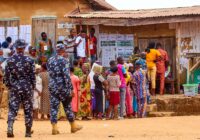African governments must provide a better level of social protection for their citizens.
The African welfare state and how it distributes resources is an interesting point of analysis. While some people see an all-inclusive welfare state structure, others see a system that overwhelmingly favors an economic elite. I belong to this latter group.
Most African countries lack a coherent welfare state structure, and only a privileged minority benefit from the provisions of a welfare state in those countries where one actually exists. The high exclusion of everyday Africans from state benefits is a common practice.
The lack of a welfare state regime in the lives of many Africans can be seen in Welcome to Lagos. This documentary chronicles the challenging experiences of artisanal workers—in this case, dump dwellers—in Olusosun Lagos, Nigeria.
Seeing this documentary offered me the opportunity to ponder over the elasticity and completeness of the African welfare state through an auxiliary inspiration provided by the medium of art. Watching the redoubt and bravado with which the young characters confronted life, I wondered whether these citizens had felt a positive impact of the Nigerian welfare state in their lives.
Deprived of the mental uplifts that stem from cerebral nurturing and application; uninsured against the macro forces that make life in a more open world increasingly uncertain; and abandoned by a political elite deficient in patriotic interest, these artisans must juggle and negotiate the vicissitudes of existence with only the supreme defiance of their muscled wills.
If we are looking at the lowest end of the spectrum with dump dwellers in Lagos, how many Africans aged 60 and over have a government-sponsored plan for pensions or allowances? How many of these senior citizens have the insurance and/or assurance of spending their latter years in dignity?
In my village of Nkitaku Agulu, I know that for every one senior citizen who receives a government-backed pension, there are 12-15 others who go without.
Certain factors determine the character of a welfare state: its mode of taxation, whether this is progressive or redistributive; and its rate of spending on education, health and social welfare and services like pensions, unemployment benefits and work accident insurance, among others.
The nature and organization of these policies go a long way to inform and shape inter-generational and intra-generational social mobility. With a number of African countries structuring any existent social policies they have on the American model—not the European one—the African welfare state hurts the most neglected citizens.
On a similar front, how many Africans are protected against the forces of the market and exploitation by the capitalist employer—be it through sick pay or unemployment benefits?
Allow me to stress that the preceding question of state protection applies only for that group of Africans who are well-off. For these people, if they do not receive such benefits today, then future generations will through sheer “privilege.” In comparison with a lot of Africans, this group is the economic elite.
It is the brawn of the African that saves him—a fact attested to by the latest edition of the World Bank’s Nigerian Economic Report. As the study states, most Nigerians, as with other developing countries, cannot afford to be completely unemployed. Those who have no productive employment typically engage in various low productivity and low paying tasks for survival. To put this in perspective, 54% of the 1.1 million jobs created in Nigeria in 2013 emerged from the informal economy.
Working at the basic level of survival is not what Africans need. Africans need to live; to take vacations; to travel; and to develop their interests in the arts and sciences. Survival is no longer sufficient. For Africans to realize a level of existence that is consistent with life in the 21st century, African governments must offer a better level of social protection and better-coordinated social policies for their citizens.
The views expressed in this article are the author’s own and do not necessarily reflect Fair Observer’s editorial policy.
Photo Credit: Jordi C / Shutterstock.com
 We bring you perspectives from around the world. Help us to inform and educate. Your donation is tax-deductible. Join over 400 people to become a donor or you could choose to be a sponsor.
We bring you perspectives from around the world. Help us to inform and educate. Your donation is tax-deductible. Join over 400 people to become a donor or you could choose to be a sponsor.
Support Fair Observer
We rely on your support for our independence, diversity and quality.
For more than 10 years, Fair Observer has been free, fair and independent. No billionaire owns us, no advertisers control us. We are a reader-supported nonprofit. Unlike many other publications, we keep our content free for readers regardless of where they live or whether they can afford to pay. We have no paywalls and no ads.
In the post-truth era of fake news, echo chambers and filter bubbles, we publish a plurality of perspectives from around the world. Anyone can publish with us, but everyone goes through a rigorous editorial process. So, you get fact-checked, well-reasoned content instead of noise.
We publish 2,500+ voices from 90+ countries. We also conduct education and training programs
on subjects ranging from digital media and journalism to writing and critical thinking. This
doesn’t come cheap. Servers, editors, trainers and web developers cost
money.
Please consider supporting us on a regular basis as a recurring donor or a
sustaining member.
Will you support FO’s journalism?
We rely on your support for our independence, diversity and quality.







Comment